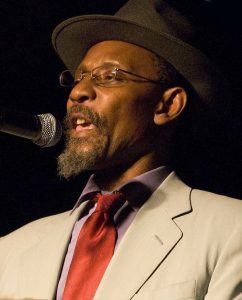About Linton Kwesi Johnson
Early Life and Education
Linton Kwesi Johnson was born on August 24, 1952, in Chapelton, a small town in rural Jamaica. In 1963, at the age of 11, he moved to London to join his mother, who had immigrated as part of the Windrush generation. Johnson attended Tulse Hill secondary school in Lambeth, where he began to develop his political consciousness.
As a young man, Johnson joined the British Black Panthers, helping to organize a poetry workshop within the movement. This experience was crucial in shaping his political views and artistic expression. He went on to study Sociology at Goldsmiths College, University of London, graduating in 1973.
Early Career and Activism
After university, Johnson became deeply involved in political and cultural activism. In 1974, he published his first poetry collection, “Voices of the Living and the Dead”. He was awarded a C Day Lewis Fellowship in 1977, becoming the writer-in-residence for the London Borough of Lambeth.
Johnson’s early work was heavily influenced by the social and political climate of 1970s Britain. He used his poetry as a “cultural weapon” in the struggle against racial oppression, giving voice to the experiences of Black British youth.
Musical Career
Johnson is credited with inventing dub poetry, a form of performance poetry set to reggae rhythms. His debut album, “Dread Beat an’ Blood,” was released in 1978, marking the beginning of a successful musical career.
Some of his most notable albums include:
“Forces of Victory” (1979)
“Bass Culture” (1980)
“LKJ in Dub” (1980)
“Making History” (1983)
Johnson’s music addressed themes of racial injustice, police brutality, and the immigrant experience in Britain. His poem “Di Great Insohreckshan” was a response to the 1981 Brixton riots.
Literary Achievements
In 2002, Johnson became only the second living poet and the first Black poet to be published in Penguin’s Modern Classics series with his book “Mi Revalueshanary Fren”. His work has been translated into several languages, and he has toured globally, from Japan to South Africa.
Johnson has also made significant contributions to journalism and broadcasting. He worked with the Race Today collective in the 1980s and produced a ten-part radio series on Jamaican popular music for BBC Radio 1.
Awards and Recognition
Johnson’s contributions to literature and music have been widely recognized:
Silver Musgrave Medal from the Institute of Jamaica (2005)
Honorary fellowship from Goldsmiths College (2004)
PEN Pinter Prize (2020)
Legacy
Linton Kwesi Johnson’s work has been instrumental in giving voice to the Black British experience and challenging racial injustice. His innovative blend of poetry and music has influenced generations of artists and activists.
Johnson continues to be an important figure in British culture, serving as a trustee of the George Padmore Institute and chair of 198 Contemporary Arts and Learning.
Through his powerful words and unwavering commitment to social justice, Linton Kwesi Johnson has earned his place as a true Black hero, inspiring and educating people around the world about the struggles and triumphs of the Black British community.
Address List
- REGISTERED ADDRESS:
16 South End, Croydon, CR0 1DN - LOCATIONS: The Exchange, Somerset House, Strand, London, WC2R 0RN
- +44 07986 745486
- info@blackheroesfoundation.org
- Registered Charity: 1169616
- Privacy Policy
PLEASE DONATE
We need your support, please donate where you can.
Help us to make a difference. To be that bright light in the corner of a dark room, giving diversity a Voice.
